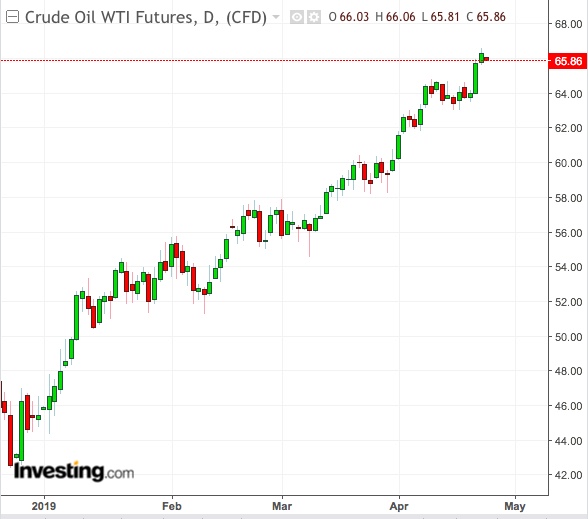In the eyes of the world, the Saudis can’t have it better than they do now, with Russia to support them on production cuts and the U.S. to work with on output increases.
Yet those in the know say such a dream arrangement can't last as ultimately either country could get sufficiently annoyed with the Kingdom to act to disrupt its best-laid plans.
For nearly five months now, Russia has been a Big Brother to Riyadh, lending its authority as the world’s biggest oil producer aside from the U.S. to join OPEC in its production cuts.
At OPEC meetings, Russian Energy Minister Alexander Novak appeared beside his Saudi peer Khalid al-Falih, while at global forums, President Vladimir Putin high-fived Crown Prince Mohamed bin Salman, sending a unified message to oil markets that the two giant producers will do whatever is necessary to bring crude prices back from the 2018 crash.
Playing a considerably lesser role with the Arabs throughout this time was U.S. President Donald Trump. Despite the historic U.S.-Saudi diplomatic alliance in the Middle East and the amiable relationship between the first families of the two countries, since late last year Trump appeared more like a villain in the Saudi narrative, after having deceived the Kingdom over the first round of the Iranian oil sanctions that led to the market’s crash.
This week though, the president and the U.S. were ostensibly back to where they originally were with the Saudis, after Washington’s decision to ban all Iranian oil exports.
Reset With U.S. Complicates Work With Moscow

Even so, the reset in U.S.-Saudi oil relations will likely complicate Riyadh’s own arrangements with Moscow. This is because the Saudis have practically forced the Russians to stay in production-cutting mode over the past five months, even after U.S. West Texas Intermediate crude prices jumped more than 40%.
Saudi Energy Minister Falih said this week the Kingdom will work to ensure the availability of oil supplies after the end of the U.S. sanction waivers on Iranian crude. Despite the pledge, the Saudis are expected to continue keeping a tight lid on OPEC oil on fear that the hedge funds that chased up crude prices since December will drive them down with similar alacrity, should the market even remotely suggest an oversupplied situation.
This Saudi double strategy of appearing to meet Trump’s need for lower oil prices without really meeting them and persuading the Russians to withhold production increases for as long as possible is unlikely to work for long. Russia’s sovereign wealth fund chief Kirill Dmitriev and oil giant Rosneft’s head Igor Sechin have warned Putin in recent months that production cuts were costing their nation market share to U.S. crude. These Russian oligarchs are openly pushing for more oil production to foster healthy competition. While the Saudis need oil to be at around $75 a barrel at least, and ideally nearer to $85, to fund their budget, the Russians can start breaking even at just about half of that price.
Russia May Want To Add To Barrels More Quickly Than Saudis
There is also the question of where Russia stands in the OPEC scheme of things, with Trump now back in the business of pushing the Saudis to do his bidding and Riyadh playing along—or at least appearing to. Putin may be magnanimous enough toward Crown Prince MbS to tolerate all this. But the need to put more Russian barrels on the market may ultimately be more pressing to him.
Trump could also lose his patience with OPEC if crude prices do not fall meaningfully from so-called higher output from the cartel in the coming weeks and months. Having put into action his plan to bring Iranian oil exports to zero, Trump expects OPEC+ members, which include Russia, to quickly reverse their production cuts, as well as replace lost barrels from Iran and other sources such as Venezuela and Libya.
The president needs cheaper fuel prices for his 2020 reelection campaign. But Riyadh isn't making any such promises. Unless he gets what he wants, a scorned Trump could go back to thinking of creative ways to disrupt the oil rally, posing more headwinds for the Saudis.
Swiss-based oil consultancy Petromatrix alluded as much in a note issued on Tuesday, saying Saudi Arabia and its prime mover within OPEC, the United Arab Emirates, have let politics take over the supply management of the cartel.
Saudis Can’t Have It Both Ways
Said Petromatrix:
“In our opinion, the fact that Saudi Arabia and the UAE have entered an explicit collaboration with the U.S. to bring Iranian oil exports to zero will make coordination more difficult and increases the odds of OPEC+ returning to free-for-all in terms of oil supplies.”
“Saudi Arabia is now in a difficult position of having an alliance with Russia to reduce oil supplies and having an alliance with the U.S. to increase supplies. You can’t have it both ways for too long.”
Then, there is the question of China, which isn’t pleased to be at the mercy of an increasingly hawkish OPEC for its oil.
Of the eight countries approved by Washington last year for sanction waivers on Iranian oil, China was the most important one, buying nearly half of Tehran’s estimated shipments of one million barrels per day.
Given the Trump administration’s laborious efforts to seal a trade deal with Beijing, the ban on Iranian oil and its impact on domestic fuel prices in China could not have come at a worse time.
Foreign Ministry spokesman Geng Shuang pushed back hard against Trump’s decision on Iran this week, saying “China consistently opposes U.S. unilateral sanctions”.
Petromatrix predicted that China will defy the Trump administration by continuing to buy oil from Iran. It estimated that Tehran will still be able to export around 700,000 bpd a year—far more than the zero desired by Trump.
